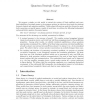Free Online Productivity Tools
i2Speak
i2Symbol
i2OCR
iTex2Img
iWeb2Print
iWeb2Shot
i2Type
iPdf2Split
iPdf2Merge
i2Bopomofo
i2Arabic
i2Style
i2Image
i2PDF
iLatex2Rtf
Sci2ools
CORR
2010
Springer
2010
Springer
Quantum Strategic Game Theory
We propose a simple yet rich model to extend the notions of Nash equilibria and correlated equilibria of strategic games to the quantum setting, in which we then study the relations between classical and quantum equilibria. Unlike almost all previous work that focused on qualitative questions on specific games, usually of small sizes, we address the following fundamental and quantitative question for general games: How much "advantage" can playing quantum strategies provide, if any? Two measures of the advantage are studied, summarized as follows.
| Added | 01 Mar 2011 |
| Updated | 01 Mar 2011 |
| Type | Journal |
| Year | 2010 |
| Where | CORR |
| Authors | Shengyu Zhang |
Comments (0)

